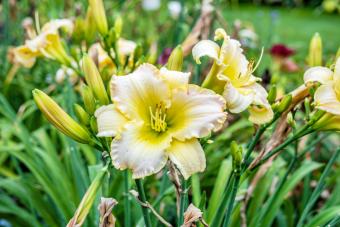
Let's get down to the real deal about dill companion plants. This aromatic herb (we dare you not to lean close and take a sniff) is an underrated addition to any garden. It's for more than just pickling (although it makes a mighty tasty pickle). Dill is decadent in a nice creamy sauce for your salmon and delightful in tzatziki, potato salads, and lamb dishes, just to name a few. Now that you're convinced, let's take a closer look at those ideal companion plants for dill.
Cucumbers

So, let's quickly backtrack to the most obvious "if it grows together it goes together" dill companion plant, right after we told you there's more to dill than pickling.
Dill and cucumber have a symbiotic relationship. Dill draws in ladybugs, bees, and butterflies, helping to pollinate cucumber blossoms. Cucumbers give the dill a shady place to hang out. It's a marriage made in heaven - and pickle jars.
Basil

If you're short on space, basil and dill cohabit quite nicely as companion plants. Both enjoy a moist soil in a cool environment, so it's one less planter to remember to water. And for your work, you're rewarded with double the fragrant herbs.
Lettuce

Dill has a few more benefits than lettuce offers dill, but that doesn't mean they aren't a great match. Unfortunately, pests love to make quick work of any lettuce. Luckily, your lettuce and dill make for excellent companion plants, as the dill repels those pests.
Onion

Aphids love dill, it's one of their favorite snacks. Luckily, you can pair your dill with a pungent companion plant: onion. The aroma of onions bothers aphids, so they stay away.
Corn

Dill gives corn a line of defense again pests that would otherwise make a meal of the ears. You'll be thanking yourself for planting dill when you take that first bite of sweet, crisp, tender homegrown grown. Best of luck on growing your own butter.
Asparagus

Just like corn, dill gets to work defending asparagus against otherwise destructive bugs and pests. This is good news for your wallet because asparagus costs way too much money for those tiny stalks. All it takes is some dill to make yours thrive.
Cabbage

If you guessed that dill repels pests and moths from cabbage, you'd be correct. The dill does triple duty with cabbage as a companion plant, keeping cabbage worms, loopers, and moths away from your future 'slaw.
Sign up for our newsletter featuring all the latest stories and products we love.
Kale

Dill will draw pollinators to your garden and straight towards your kale. And you want pollinators to bring that sweet, crunchy, earthy kale to life. There's more! Dill also attracts bugs that are interested in eating pests that enjoy kale. More kale for you!
Avoid Tomatoes, Carrots, and Peppers

There are a few plants that are less than companionable with your dill. Avoid these if you want an amicable garden.
- Tomatoes: Dill can stunt tomato growth, which is the opposite of what you want, but it can keep the hornworm at bay when the plant is young
- Carrots: Believe it or not, dill and carrots can create a hybrid plant that, although it sounds fun in theory, doesn't taste good at all.
- Peppers: Steer clear of nightshade plants with dill, as dill can cause those plants to struggle to thrive.
Companion Plants That Are the Real Dill

If you're having a companion plant problem, the best approach sometimes is to just dill with it. Thankfully, you don't need to worry about this becoming a big dill, not with this guide to help you sow the best garden you can.







